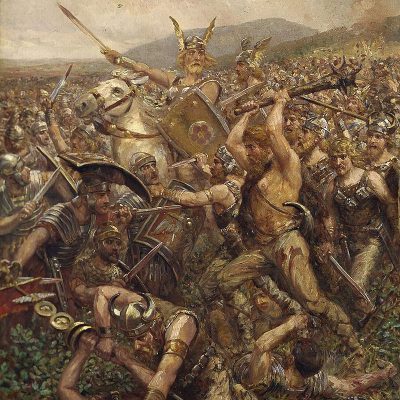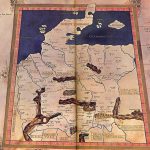Chapters
Publius Quinctilius Varus was born around 46 BCE in Cremona. He was a Roman politician and commander during the reign of the first Emperor Octavian Augustus. He commanded three Roman legions destroyed in the Teutoburg Forest by the Germans under Arminius.
Origin and Personality
Varus came from an impoverished patrician family – gens Quinctilia. His father, Sextus Quintilius Varus was a senator associated with the conservative-republican wing of the senate. In 49 BCE he was a quaestor. He took part in the civil war against Caesar. He survived the defeat of the Republicans to take their side again after the assassination of Caesar in 44 BCE. After the Republican defeat in the Battle of Philippi, he committed suicide. Varus’s mother remains unknown. His paternal grandfather, also Sextus Quintilius Varus, was a senator.
Varus had three sisters who were most likely younger than him.
Velleius Paterculus describes Varus’ personality as follows:
Varus Quintilius […] was a man of mild character and of a quiet disposition, somewhat slow in mind as he was in body, and more accustomed to the leisure of the camp than to actual service in war.
– Velleius Paterculus, Roman history, 117
Political and military career
Varus took a different stance on political change than his father did. He became the henchman of Caesar’s successor, Octavian Augustus. He married Vipsania Marcela Agrippina, daughter of Marcus Agrippa, August’s friend and associate. At Agrippa’s funeral in 12 BCE, Varus gave a speech of praise in honour of his father-in-law. He was the brother-in-law of the future Emperor Tiberius, married to Vipsania Agrippina (another daughter of Agrippa), and his friend. As a result of joining the imperial family, his career significantly accelerated. In 23 or 21 BCE he was a quaestor, accompanying Octavian on his journey to the eastern provinces. His cursus honorum ended in 13 BCE when he took office as consul with Tiberius.
Between 8 and 7 BCE he was governor of the province of Africa, and then governor of Syria (from 7/?to 4 BCE), with 3 legions under his command. During his governorship, he conducted a strict policy aimed at exploiting the population with high taxes. His task was also to maintain peace in the vassal kingdoms. The situation in Judea, ruled by King Herod and his successors, required much intervention. After Herod’s death in 4 BCE, there was a messianic revolt in Judea, known as the Varus war. After the capture of Jerusalem, Varus ordered the crucifixion of 2,000 Jewish fighters to intimidate the inhabitants and bring them under control.
After returning from Syria, he stayed in Rome for several years. Being closely related to Tiberius, he was sidelined by Augustus. During this time he married Klaudia Pulchra – the granddaughter of Octavia, August’s sister. In the first years of the 1st century CE, Germania became the most important theatre of military and political activity. The long military campaigns of Tiberius, his brother Drusus the Terrible, Lucius Domitius Ahenobarbus and Germanicus, between 10 BCE and 6 CE, ended with the pacification of several Germanic tribes, such as the Cherusci. Battles were fought mainly north of the Upper Danube and east of the Rhine. The purpose of the expansion was to expand the Roman rule and at the same time shorten the elongated border. In 6 CE, Tiberius announced that Germania had been pacified.
Battle in the Teutoburg Forest and death
In CE 7, Varus became the governor of Germania. This is how his actions in Germania are described by Paterculus:
When placed in charge of the army in Germany, he entertained the notion that the Germans were a people who were men only in limbs and voice, and that they, who could not be subdued by the sword, could be soothed by the law. With this purpose in mind he entered the heart of Germany as though he were going among a people enjoying the blessings of peace, and sitting on his tribunal he wasted the time of a summer campaign in holding court and observing the proper details of legal procedure.
– Velleius Paterculus, Roman history, 117
In September 9 CE, Varus was stationed in a summer camp on the Weser (today’s city of Xanten) with three legions (17th, 18th and 19th). Varus wanted to lead the army to Moguntiacum (now Mainz) when news came to him of an expanding revolt on the Rhine. The information was provided to him by Prince Arminius of Cheruski, whom Varus trusted, against the suspicions of Segestes – a noble from the Cherusci tribe. Arminius was a Romanized German prince, commander of the auxiliary cavalry troops. The revolt was to break out in the areas east of the Rhine.
Arminius and the Cherusci tribe prepared a trap for the marching legions of Varus. They made the most of the surprise and the dense forests of Germania. In September 9 CE at Kalkriese (east of what is now Osnabrück), the legions were ambushed. Wet and densely forested areas made it impossible for the legionaries to close their formation. On the third day of the battle, the Romans were pushed to the Kalkriese hill, located north of Osnabrück, where the final pogrom took place.
As a result of the three-day battle, all three legions were killed. Nearly 20,000 people died. Legion eagles were also lost, which was an additional detriment to the honour of the Romans. Paterculus reports that some of the Roman cavalries managed to escape from the battle site; on their way to the Rhine, however, the riders were intercepted by Germanic scouts and killed. According to Edward Gibbon, the Romans who were taken captive were kept in cages and then burned alive. Others have been enslaved or redeemed. Tacitus and Florus report that captured legionaries were sacrificed years later on pagan altars. Varus himself committed suicide.
The general had more courage to die than to fight, for, following the example of his father and grandfather, he ran himself through with his sword.
– Velleius Paterculus, Roman history, 119
The severed head of Varus was sent by Arminius as a gift to the Marbod king of the Marcomanni. He sent her back to Rome, where Octavian buried her in the family’s mausoleum.
The defeat in the Teutoburg Forest was one of the greatest in the history of Rome and prevented the further conquest of Germany. Suetonius reports that on sleepless nights, Octavian Augustus walked in the corridors of his palace, shouting Quinctili Vare, legiones redde – “Varus, give me back my legions!”. Moreover, as a sign of mourning, August neither cut his hair nor shaved his beard for months1.
Actions after Varus’ death
Upon hearing of Varus’ defeat, his nephew Lucius Nonius Asprenas sent two legions under his command: I Germanica and V Alaudae to the north to secure the crossing of the Rhine. Thus, he prevented a German invasion of Gaul. In the years that followed, 9-11 CE, troops led by Tiberius calmed down the situation in Germania. At the turn of 15 and 16 CE, Germanicus made two successful expeditions against the Germans led by Arminius. There he found and buried the remains of three legions left over from the famous massacre in the Teutoburg Forest in 9 CE.
Marriages and children |
|









